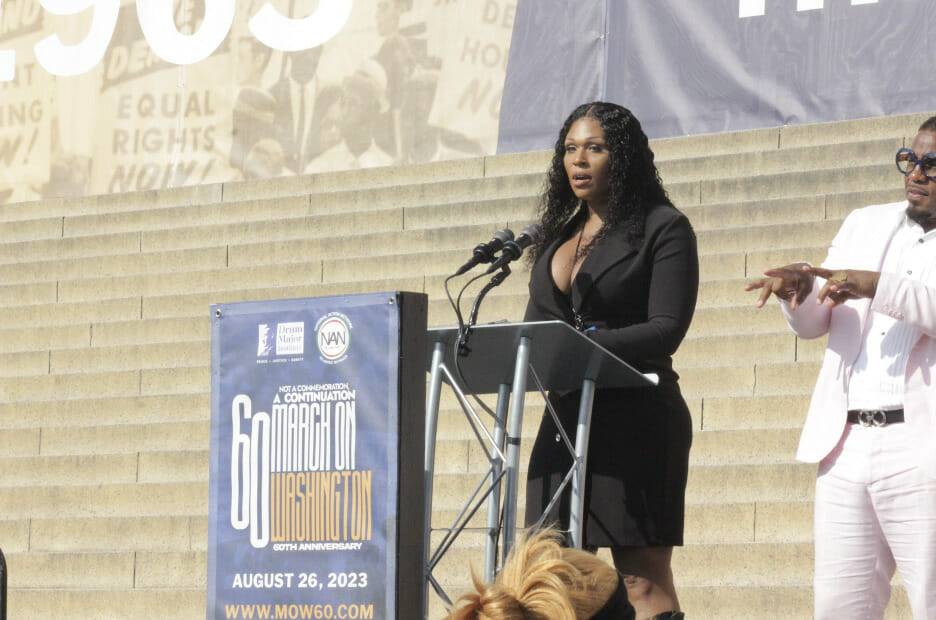Washington D.C.— Sixty years have passed since a recorded 250,000 people traveled to the nation’s capital to attend the historic March on Washington for Freedom and Jobs, organized by strategist and civil rights leader Bayard Rustin, an out gay man and trusted advisor to Rev. Dr. Martin Luther King Jr. On August 26, 2023, on the exact steps where King delivered his famous “I Have A Dream” speech, Black trans actress and GLAAD board member Peppermint, in a rousing speech, illuminated the progress and setbacks of Black LGBTQ people in the decades since Rustin’s contributions were nearly erased from history due to criticism and discrimination surrounding his sexual orientation.
“I stand before you today, a Black transgender woman living in my truth, to affirm not only the contributions and excellence of leaders Bayard Rustin and Marsha P. Johnson, but the contributions and excellence of LGBTQ people and LGBTQ people of color worldwide,” said Peppermint.
Billed by the National Action Network, chief organizer of Saturday’s March, as a continuation and not a commemoration of King’s dream, the inclusion of 200 organizations representing Black, Latino, Jewish, AAPI, LGBTQ, women, and labor communities served as a disruptor to the notion that progress for Black LGBTQ people or other marginalized groups is a threat to Black progress. Peppermint directly connected the two movements while highlighting the adversaries working to undermine social and political progress.
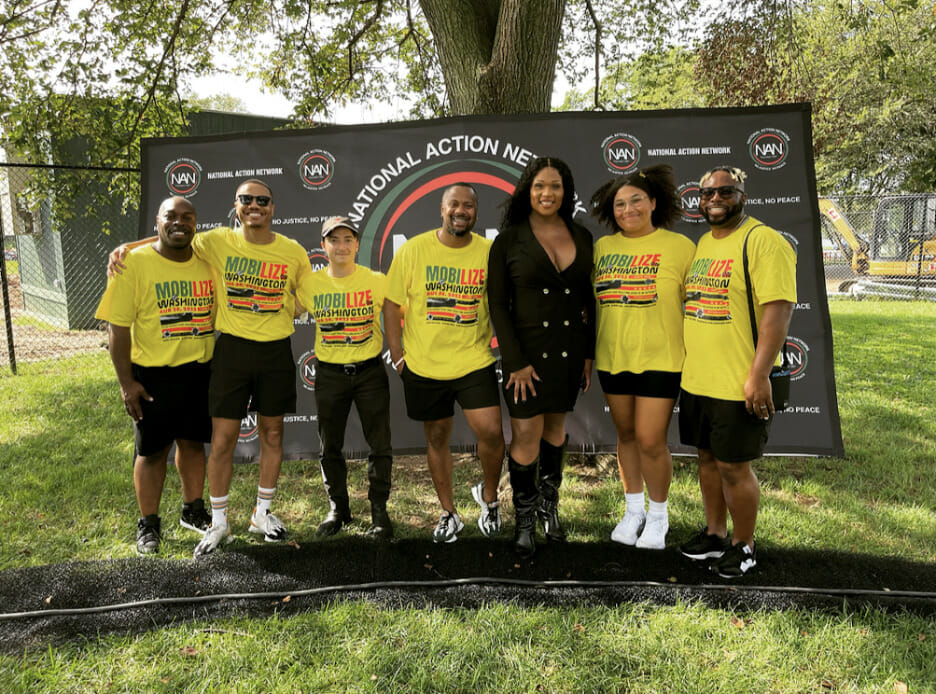
“The people who are interested in rolling back and dismantling LGBTQ rights are also interested in removing African-American studies and Black history from our schools,” said Peppermint. “They’re also the same people invested in stopping us from having bodily autonomy and making decisions about our own healthcare,” she added.
Peppermint further said that Black LGBTQ people, “in a nation that our ancestors helped build, will not be intimidated into backward mobility. We will not give up our hard-won progress. We will not back down in the face of increased violence, harassment, or the anti-LGBTQ and anti-Black legislation currently sweeping the nation.”
GLAAD and the ADL have tracked more than 350 anti-LGBTQ threats and attacks this year, coinciding with a disturbing increase in anti-LGBTQ rhetoric and legislation across the country.
“The brave souls who marched here six decades ago laid the foundation for change, demanding civil rights and an end to racial injustice,” wrote Hope Giselle, a Black trans advocate representing the National Black Justice Coalition, in an Instagram post following her historic speech preceding Peppermint.
“As we reflect on their legacy, let us also acknowledge that the fight for equality is not confined to a single path. Our call for justice must embrace every individual, regardless of identity.”
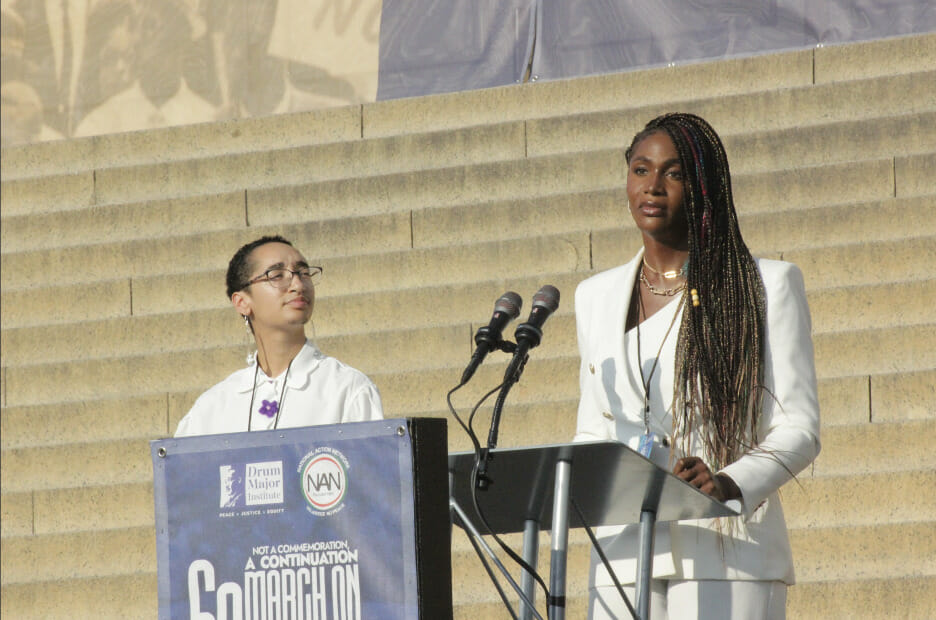
“If your fight, if your advocacy, if your moments, if your words do not include the struggles of all Black people, then it is trash,” said Giselle. “If you willfully look over the transgressions happening to your Black and Brown, queer brothers, sisters, and siblings while expecting us all to move into this movement without resentment, you’re sadly mistaken.”
Giselle also noted the proverbial “cookout invitations” often given by Black people to those outside the community who do the bare minimum in support of Black culture but, because of homophobia, will withhold the same invitations to their Black LGBTQ brothers and sisters.
“My dream is that when I walk into my home—when I see the faces of the people that look like me, they are not turning up in disgust because of the way that I show up and the contributions that I and the rest of my community make towards the betterment of Blackness is accepted as valuable,” said Giselle.
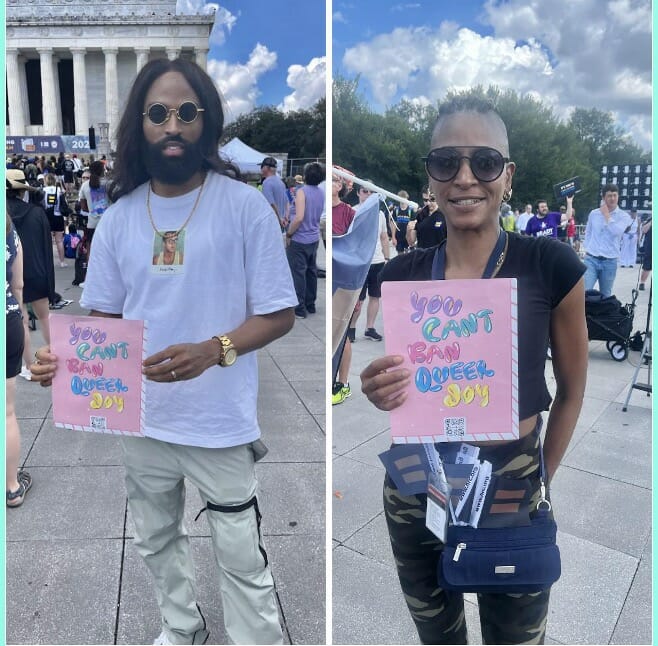
“It is a gap that exists, and if we’re fighting for humanitarianism and [against] racism, we should fight together,” said Rashida Bellfield, one of several marchers participating in The Human Rights Campaign contingent.
Diversity, Equity, and Inclusion Specialist Brian Turner tells GLAAD that including Black LGBTQ people and organizations at the March is intentional and necessary.
“As we do this work to fight not just for our freedom, but for our emancipation from the systems in this country, we are intentional about making sure that we’re inclusive of Black queer people,” said Turner. “So centering them here, I think, is one step not just in visibility but also in ensuring that systems change.”
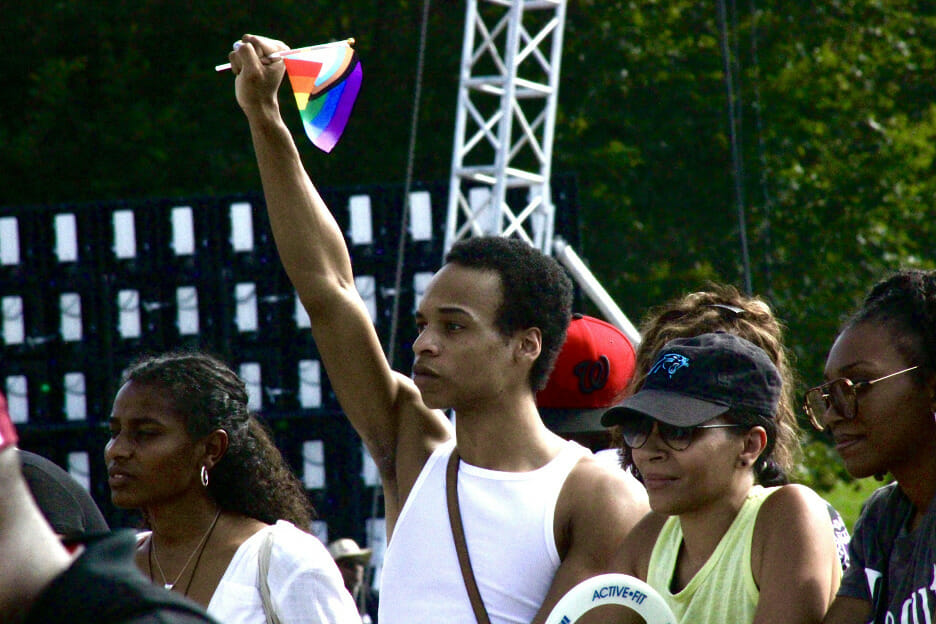
“To the community, my community, our community, and LGBTQ people and youth everywhere: I see you. I love you. I am you. And I am with you,” said Peppermint at the closing of her speech. “Remember, as hard as they may try, they can’t ban Black joy. They can’t ban queer joy. And they can’t ban queer Black joy!
Watch Peppermint’s entire speech here.
Watch Hope Giselle’s entire speech here.

